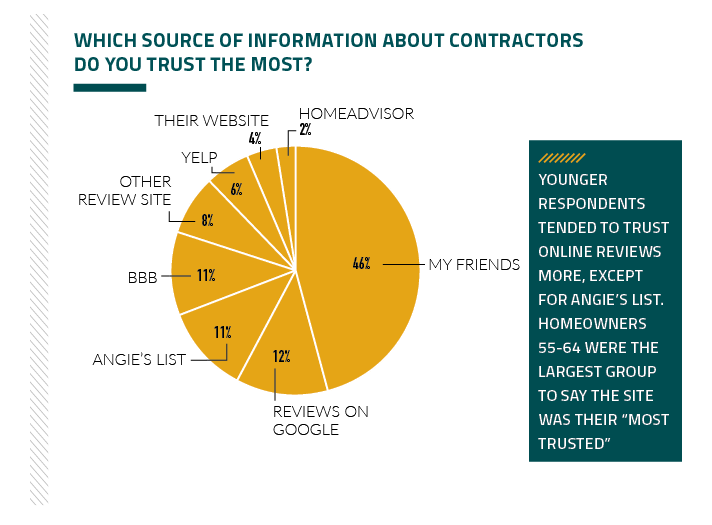You’ve done your homework and your dream kitchen is nearly a reality. Your design goals have been laid out and met, your overall budget set. You’ve picked out cabinets, countertops, and lighting. The final step is to find a reputable kitchen remodel contractor you can trust with your dream. A kitchen renovation is often a homeowner’s once-in-a-lifetime project, so it’s got to be as perfect as humanly possible.
With any home renovation project of this magnitude, hiring an unlicensed or disreputable contractor can be both a financial and emotional disaster. It’s crucial that you find a trustworthy, experienced professional who is honest and will get the job done on time.
According to Consumer Reports, the top homeowner remodeling complaints are cost overruns, shoddy or rushed work, poor communication, and contractors who don’t show up when they say they will.
Follow these tips to help find your own trusted contractor for your kitchen remodel project.
1. Make A List of Contractors
Get recommendations from people you know. Make a list of contractors by asking friends, family, neighbors and co-workers who they’ve worked with.
Word-of-mouth referrals go a long way to finding the right contractor. If that’s not an option for you, plenty of online services can help your search. Here’s a list of free online services you can use to start compiling a contractor list:
Angie’s List
One of the oldest and most trusted review services for local home needs, Angies’s List supplies users with names of local contractors, read and write reviews, and request quotes. Be aware that businesses pay to advertise on Angie’s List in order to show up higher in the search results, even if they don’t have the best ratings.
HomeAdvisor
This is a free service that matches users with available local contractors. Rather than browsing a list of contractors like Angie’s List or Houzz, homeowners answer a series of preliminary questions about their project, information which HomeAdvisor then sells to local contractors as a lead. Be prepared to start getting calls from contractors soon after you complete the questionnaire. All contractors must pass a HomeAdvisor background check as well.
Houzz
One of the best online sources for project inspiration and design ideas, Houzz is a free site that lets homeowners browse project galleries and post reviews of local pros. Like Angie’s List, Houzz features paid listings at the top of their search results.


Chart courtesy of Pro Remodeler
2. Check Reviews and Ratings
Customer reviews are a great source of information. Look for a wide range of reviews on many different projects. This will give you an idea of the contractor’s experience and areas of expertise. All of the sites above show ratings and reviews, but check with other websites such as the Better Business Bureau, Porch, Yelp, and Google My Business. Companies sometimes have customer reviews posted on their website as well.
For any negative comments or reviews, see if the kitchen remodel contractor provided a response. Were their responses diplomatic and professional? Was the problem eventually resolved to the homeowner’s satisfaction? These online conversations shine a light on how the contractor might interact with you on your project.
Verify that the contractors on your list are licensed and insured. Check your state and county licensing standards to be sure contractors comply and are fully covered.
3. Give Detailed Project Information
For the most accurate quotes, give each contractor the identical description and details about your project. Communication is key, so the more detailed and specific your instructions, the more accurate your contractors’ quotes will be.
Your details should include a full kitchen design with diagrams and installation notes, type of cabinets, countertop material, flooring brand and material, placement of electrical fixtures, outlets and switches. Also note your timeline and expectation for working hours and any other on-site issues. A good contractor should be able to provide you this information up front.
4. Interview Contractors
Don’t be afraid to ask as many questions as you need to be sure the contractor can handle the project you’ve envisioned. Connecting with a person and communicating comfortably is more important than the numbers, which can always be negotiated. The contractor you choose will be spending lots of time with you, so feeling comfortable having them in your home is obviously important.
Here are some sample questions when interviewing contractors:
- How long have you been in business?
- Are you certified, licensed, bonded, and insured?
- What percentage of your business is repeat or referrals?
- Are you a member of a national trade association?
- Do you have a list of references from your past 3-4 projects, including a present project?
- Do you provide a detailed written contract?
A detailed written contract helps you and the contractor know what is expected. The contract should be very specific, and each step of the project should be spelled out. An estimated completion date should also be included. - What is your process for change orders?
Change orders are part of every kitchen project because there has never been a perfect kitchen remodel. Make sure that each change order is agreed to by everyone. Clearly note the change, price, time and any adjustments that need to be made.
Digging Deeper
What are your payment terms?
A kitchen remodel contractor’s payment terms often depend on the scope of the work. Generally, the contractor will ask for an initial deposit of up to 30-50% of the total budget. It’s not recommended to pay the entire job up front. You should hold a significant portion of the money until the project is completed, and all details are to your satisfaction.
Do you provide itemized pricing?
A quality contractor will provide a price estimate itemized with cost of labor, demolition, materials, electrical, plumbing, permits, and more. An itemized list is important because you may encounter unexpected expenses midway through your project. For example, say you discover mold in your walls. To properly clean it, you need to trim back your existing budget, so you decide to put in a less expensive countertop than the one originally discussed. It’ll be important to know the exact cost of the first countertop, to make sure you’re credited back the right amount.
Who will be working at the site?
Your contractor will not be the only person working on site; in fact, they may not do any of the physical labor. It is very common for general contractors to be responsible for supervising and coordinating multiple projects and job sites including your project. Ask your contractor for a list of subcontractors they use. The subs are the muscle behind the remodel, and you’ll want to know who they are.
5. Request Bids and Check References
Remember the “Rule of Three.” Request at least three bids from the contractors you feel comfortable with. Ask them to include a breakdown of the price and estimated start and finish dates. Eliminate bids that are underpriced or overpriced compared to the others. That could be a sign that a contractor is either cutting corners or overcharging you. If you provided clear and detailed information, the quotes should be similar in price.
As you compare bids and get closer to making a final decision, reach out to references and previous customers. While it can be time consuming to call and email references, it’s worth the effort. The information they provide may prevent suffering down the road.
When You’re Ready to Sign
Read every word of the contract before you sign it. Feel free to bargain over details before you sign. A contract should include:
- Names, addresses, and phone numbers of material suppliers and labor
- A detailed list of work to be completed with start and estimated finish dates
- Daily work hours
- Itemized pricing by labor and materials
- Payment terms
- Who will secure permits (this should be the contractor)
- Documentation of insurance, bonding, and licensing
Once the project is in full swing, keep an eye on progress but don’t hover or engage the crew in long conversations. If issues or concerns arise, be friendly but firm. You and your contractor should be able to work together to address any problems that may arise during your kitchen remodel. If you’ve taken the time to prepare for this project with due diligence, you’ll soon be enjoying your shiny, efficient, stylish new kitchen!














